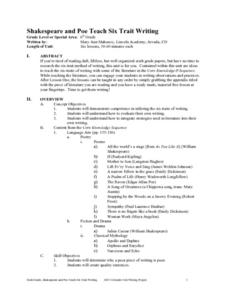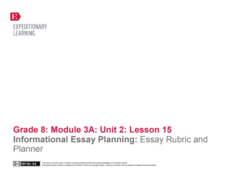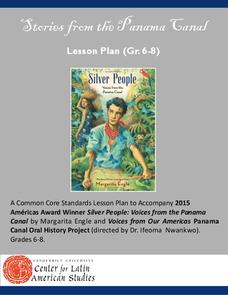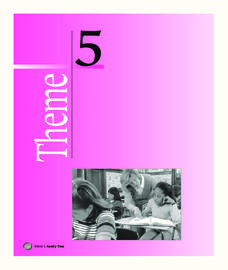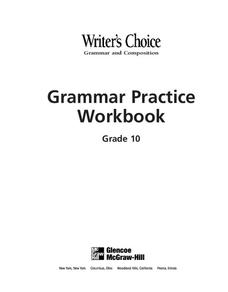Core Knowledge Foundation
Light and Sound Tell It Again!™ Read-Aloud Anthology
Light and sound are the running themes of a read-aloud anthology. Over three weeks, third graders listen to discuss readings in preparation for completing extension activities. Pupils work through the writing process to compose an...
Curated OER
Borrowing Narrative Skills from Mr. Fletcher: Using a "Prompts in Reverse" Technique to Inspire Your Writers
Help your class find their writing voices with this instructional activity which uses the work of Ralph Fletcher to guide a "Prompt in Reverse" activity. Using the chapter "First Pen" from Fletcher's Marshfield Dreams, learners decipher...
Curated OER
Shakespeare and Poe Teach Six-Trait Writing
A Six-Trait Writing instructional activity helps your middle schoolers liven up their word choice and shows them how to evaluate their own writing. Class members take a close look at the language used in poems by Shakespeare, Kipling,...
Curated OER
"Take my Advice": Poems with a Voice
Discuss the meaning of the phrase tone of voice with the class. They respond to a variety of scenarios where a particular tone would be prevalent. They then read "Mother to Son" without knowing the title and answer some questions about...
Curated OER
Business English at Work: Verb Tense, Voice and Mood-Verbals
Demonstrate the various tenses of irregular and regular verbs. The verbs be, do, and have are charted out for the present tense, past tense, and past and present participles. Likewise, many regular verbs are conjugated into present,...
National Endowment for the Humanities
Poems that Tell a Story: Narrative and Persona in the Poetry of Robert Frost
Dig in deeper with Robert Frost's, "Stopping by Woods on a Snowy Evening." Learners will read and discuss poems by Robert Frost and learn the meaning of terms such as narrative and personal. They journal, collaborate, and present poetry...
Facing History and Ourselves
Finding Your Voice
To begin a study of what it means to be American, high schoolers first consider their own identities. They draw a picture of what they think an American looks like and share their images. Next, they examine an image of the "Flag of...
National Endowment for the Humanities
Literary Genres in “Moby-Dick”
Moby Dick is more than a whale of a tale narrated by Ishmael. A lesson studying Herman Melville's classic novel asks readers to examine the different genres the author weaves into his story. Instructors model how to conduct a stylistic...
National Endowment for the Humanities
Dramatic Perspective in Moby Dick
A lesson on Herman Melville's Moby Dick asks readers to compare the first person point of view of Ishmael in Chapter 1 to Captain Ahab's dramatic monologue in Chapter 37. Readers cite evidence from the chapters to support their analysis...
National Endowment for the Humanities
Narrative Voice in Moby Dick
Call him a reliable narrator! Ishmael is the focus of a lesson that asks readers to analyze the complex character of Herman Melville's narrator as he is introduced in the first chapter of Moby Dick.
Academy of American Poets
Voice
Four lessons make up a poetry unit that introduces high schoolers to spoken and written poetry. Class members also examine poems as social commentary and connect these poems to various novels and plays. A great way to incorporate poetry...
Transforming Education
Trauma-Informed SEL Toolkit
The Trauma-Informed SEL Toolkit is a presentation for educators who seek to create a reliable environment where scholars who have experienced adversities and trauma feel supported, safe, and ready to learn.
Smithsonian Institution
The Vocal Blues: Created in the Deep South of the U.S.
Bring the sounds of the deep South vocal blues to the classroom with a Smithsonian Folkways lesson. In preparation, scholars listen to and count the 12 bar blues patterns in several works and identify the I, II, IV, and V chords as well...
Thoughtful Learning
Adjusting Your Writing Voice
"Yo, what's up?" "Nuttin!" While such a dialogue might be appropriate between friends, it would be ill-advised in more formal situations. A mini-lesson asks young writers to consider how to adjust the voice they use to bring their...
EngageNY
Analyzing an Author’s Craft: Carlotta’s Journey to Justice
Find your voice. Readers look at a passage from A Mighty Long Way and discuss what it means for Carlotta to find her voice. After discussing figurative language and idioms, learners listen to the song "This Little Light of Mine" and...
EngageNY
Informational Essay Planning: Essay Rubric and Planner
Pupils walk through the process of writing essays for their final assessment of Unbroken. They begin by reviewing the rubric using Rubric Criteria strips that assign a portion of the rubric to each pair of learners. They then participate...
Vanderbilt University
Stories from the Panama Canal
The stories of the Silver People, the West Indies immigrants hired to work on the Panama Canal, come to life in a lesson about the building of the Panama Canal. Groups research why the canal was built, how it was build, the working...
Do2Learn
Tone of Voice and Volume Control
What level of voice is most appropriate for the classroom? Develop volume control in your learners with ASD with an activity that lets them know when they are using appropriate and inappropriate voice level.
Houghton Mifflin Harcourt
Family Time: English Language Development Lessons (Theme 5)
Support English language development with a family-themed unit consisting of a series of lessons designed to get your scholars moving, looking, speaking, writing, and listening. Conversation topics include birthdays, family...
National Council for the Social Studies
Analyzing a Product or Political Advertisement
How do advertisements evoke specific thoughts and feelings? Class members find out through the exploration of the Internet, videos, television, magazines, radio, and posters. Learners investigate commercial advertisements, political...
Winterhill School
Poetry Analysis
Gain greater insight into poems using a poetry analysis learning exercise. Here, scholars follow steps and answer questions to dissect any poem. Topics include the poem's meaning, theme, technique, and structure, as well as personal...
McGraw Hill
Grammar Practice Workbook
Make sure your pupils exercise their grammar muscles with this collection of worksheets. Organized into units, the packet covers everything from the parts of speech to sentence structure to punctuation.
Smekens Education Solutions, Inc.
Introducing the 6 Traits to Students
Put together an English language arts unit on the six traits of writing with this helpful collection of resources. From fun songs to differentiated writing exercises reinforcing each of the traits, great ideas are provided for developing...
Curated OER
Passive Voice Exercises
What is the difference between the active voice and the passive voice? Focus on the latter with your middle schoolers to help them strengthen their writing. First, they identify which sentences are written in the passive. Then, they...




